| Srl | Item |
| 1 |
ID:
173979
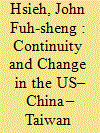

|
|
|
|
|
| Summary/Abstract |
The relations between China and Taiwan (cross-Strait relations) have been a thorny issue for all parties concerned. These relations are one of the flashpoints in the world, which may trigger a serious military conflict. They involve not only China and Taiwan but also the United States. The purpose of this paper is to account for the trajectory of this triangular relationship with the help of opinion surveys in Taiwan. It is shown that when the Kuomintang (KMT) gains the governing power in Taiwan, Taiwan is the median voter in the cross-Strait relations game at the international level while as a non-traditional KMT or the Democratic Progressive Party is in power, it is the US that turns out to be the median voter.
|
|
|
|
|
|
|
|
|
|
|
|
|
|
|
|
| 2 |
ID:
062543
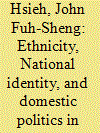

|
|
|
|
|
| Publication |
Feb-Apr 2005.
|
|
|
|
|
|
|
|
|
|
|
|
|
|
|
|
| 3 |
ID:
072147
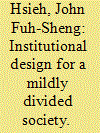

|
|
|
| 4 |
ID:
107320
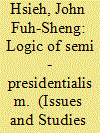

|
|
|
|
|
| Publication |
2011.
|
| Summary/Abstract |
Semi-presidentialism is a vague term which may refer to several different forms of government. This paper explores only one special type of semi-presidentialism, and shows that, even under similar institutional arrangements, actual practices may differ greatly. The two cases, France and Taiwan, share the basic features of such a system, though the French president has more powers than his counterpart in Taiwan. But interestingly, when the presidents party/coalition has been in the minority in parliament, the French president has frequently chosen to compromise and to cohabit ate with a prime minister supported by the parliamentary majority, while his counterpart in Taiwan has decided to confront the parliament by forming a minority government. As argued in the paper this can be accounted for by strategic behavior on the part of the president and the parliamentary majority in manipulating the loophole created by such a system. History and the nature of social cleavages have something to do with it as well.
|
|
|
|
|
|
|
|
|
|
|
|
|
|
|
|
| 5 |
ID:
053372
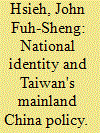

|
|
|
| 6 |
ID:
092510
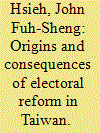

|
|
|
| 7 |
ID:
130196


|
|
|
|
|
| Publication |
2014.
|
| Summary/Abstract |
The year 2013 in Taiwan was marked by a lackluster economy and stalemated politics. President Ma Ying-jeou's approval rating hit an all-time low. Still, Taiwan's relations with China were smooth, and Taiwan was able to make some gains in the international arena.
|
|
|
|
|
|
|
|
|
|
|
|
|
|
|
|